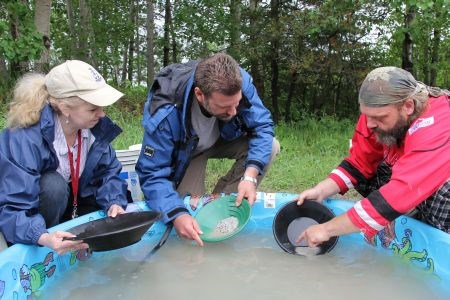If you've ever dreamed of finding nickel in them thar hills—or you just want to know more about mineral exploration—the Sudbury Prospectors and Developers Association is hosting a series of workshops open to anyone with a lingering curiosity about the industry.
Held Tuesday evenings over nine weeks, the Introductory Prospecting and Mineral Exploration Workshop is an initiation into all the facets of mineral exploration, from staking and holding a claim to mineral and rock identification. No prior knowledge about the industry is required.
With two successful workshops under his belt—the first was held last spring, while the second was held this autumn—organizer Joshua Bailey is planning to make the workshops an annual activity, to be held each fall.
Bailey, the association's second vice-president, said the workshops have attracted an eclectic group of interlopers. Students, retirees, entrepreneurs, and workers in the mining supply and services sector have all found value in the teachings, which are provided by guest speakers specializing in different areas of the industry.
“Some people doing the course are interested in getting started in staking claims and doing it,” said Bailey, manager of joint ventures for Wallbridge Mining Company. “Some people maybe invest in companies and want to know better how to interpret what they're hearing; others work in the industry or the community and are just curious about how the mining industry works.”
Introduced to a similar course in the Yukon several years ago, Bailey said he was surprised that, given the breadth of mining activity in the Sudbury area, regular educational courses on mineral exploration weren't already being offered.
Information sessions can provide insight into mineral exploration and break down misconceptions about how the industry operates, he added.
“There are a lot of misunderstandings about what mineral exploration is and the value of it, and so, from a political perspective, sometimes you can get policies and regulations that don't really make a lot of sense, because it's not understood what (prospectors are) doing,” Bailey said. “So one of the interests for the association is to raise the general level of awareness of what mineral exploration is, what it isn't, and how it works.”
In Canada, which operates under a free-entry system, staking a mineral claim is as simple as getting a prospector's licence at a cost of $25.50 through the Ministry of Northern Development and Mines. A grassroots type of system with a strong entrepreneurial spirit, mineral claim staking is open to everybody, Bailey said, and the association wants to ensure that everyone has access to that information.
“The mining industry is going bananas right now, and it's open for anybody that wants to participate in that and possibly find the next Ring of Fire or the next mine, or even just try to attract investment to the local area,” Bailey said. “Even money that's spent on exploring is often money from outside the region that's getting spent locally.”
He additionally sees value in disseminating data gleaned over decades of mineral exploration in Canada that is readily available to the public—much of it on the Internet—and the workshops guide potential prospectors to the right places to find it. At the ministry website, for example, visitors might find and download a 130-year-old map of Sudbury, along with the accompanying report that described the types of mineralization early surveyors were seeing in the area.
“There's a ton of information out there,” Bailey said.
The inaugural pair of workshops easily surpassed Bailey's expectations for registration, and reception so far has been positive. The fall course wrapped up at the end of November, but information on future workshops is available by emailing sudburyprospectorcourse@gmail.com or calling 705-662-0112.




